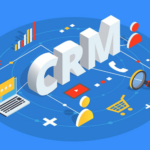Business events have always been an important part of marketing to build and improve relationships with customers and prospects. Whether you host seminars, congresses, trade shows, or hospitality events, each event type has its advantages to exchange information, trial products, tighten relationships … And what business events are all about, create value for the company.
The future of events is hybrid, but not as you might expect

Because of COVID-19, some of these events have been completely stopped and others have gone virtual, like for instance webinars or virtual fairs and concerts. Fortunately, we still stay connected this way, but admittedly we missed certain things in that online environment: the coffee chat with the other guests beforehand, the lunch where you gain new insights, or the drink after where new connections are forged. Not to mention the real physical experience of a concert or a sports event where you laugh, dance, experience things together, which will be remembered with a warm feeling.
At the same time, we have found that these virtual meetings also offer their advantages. I have not missed the endless traffic jams for instance. And as an organizer, you have fewer limitations in terms of capacity and budget, and you can quickly reach a large audience. So let us be clear: virtual events are here to stay, in addition to and in combination with the other event types that couldn’t be held because of COVID19.
There is no question that physical events will revive as soon as it is allowed and (safely) possible. (Almost) everyone is thoroughly tired of sitting home alone staring at a screen. But even more than in the past, it becomes relevant to ensure that these events pay off optimally. The events may be on a smaller scale and we will certainly have to take COVID guidelines into account initially. More reason to ensure that you have the right tools to follow up and communicate everything quickly and efficiently and that you have a full room with the right guests. The right guests are those prospects and customers that matter for your business.
But what about those hybrid events? And what exactly does that term mean? The first thing most people think of is an event that can be followed in real life or from behind a screen at home at the same time.
This simultaneous form of “hybrid” will have its place but will certainly bring challenges because an online event and a physical event each have their own rules. If you want to run this simultaneously, you must think carefully about your organization and how you keep both target groups involved. Some examples: during physical events, there may be some delay in the schedule due to a morning monster traffic jam or a delay at the buffet … How do you keep your digital audience on board during these delays? Breaks in the physical world are also networking moments. How do you capture this digitally while you and your team are mingling with guests in the event venue?
A successful event is a combination of the right content with your ideal target group. And this content must of course be presented (= engagement, experience, interaction) in such a way that value is created (= leads, better relationship, brand awareness…). Therefore, a hybrid event need not be limited to “addressing a physical and digital audience at the same time.” You must make optimal use of the content to best reach your audience and above all ensure that you can create involvement and value.
For example, you could record your seminar and then reuse it online for a large group at a certain time while still ensuring that interaction is possible during the online event through, for example, a Q&A or real-time discussion groups. And a step further, you can start using your content one on one if you would provide on-demand access to the recordings of the event and even enable live chat with relevant employees who are online at that time.
Conclusion: Although today most events happen virtually, the in-person events will return while the virtual events of which companies have discovered the benefits continue to exist. Hybrid events will also be on the rise. But the hybrid events where the online and physical audience are served simultaneously will form a minority because these are organizationally and technologically demanding solutions. Most hybrid events will be events where the same content is distributed separately for a virtual and physical audience.
Business events work and create value. So, we look forward to a future with even more possibilities. There will be more event types, each with its possibilities and challenges. It is therefore even more important to use the right tools to manage and automate your events, to coordinate them, and to use data in an integrated manner to maximize the outcome of your events. And for the virtual events, we will see that networking opportunities, especially those between the sales team and the customer, will gain in importance. Here too, the right online tools will play a vital role.
Curious how to make your event marketing future proof?


